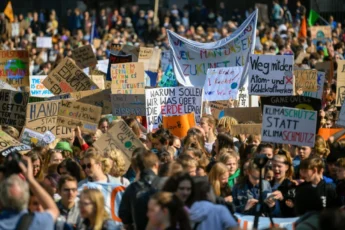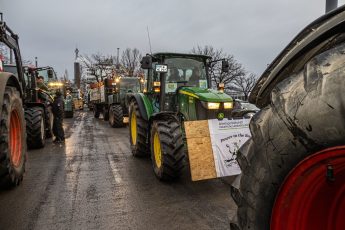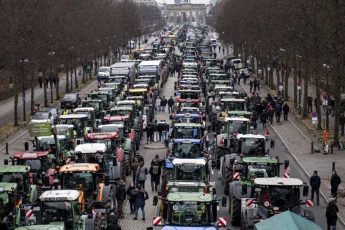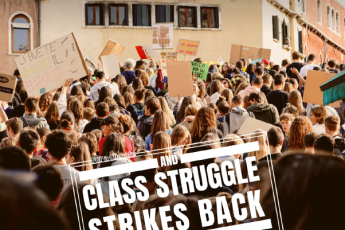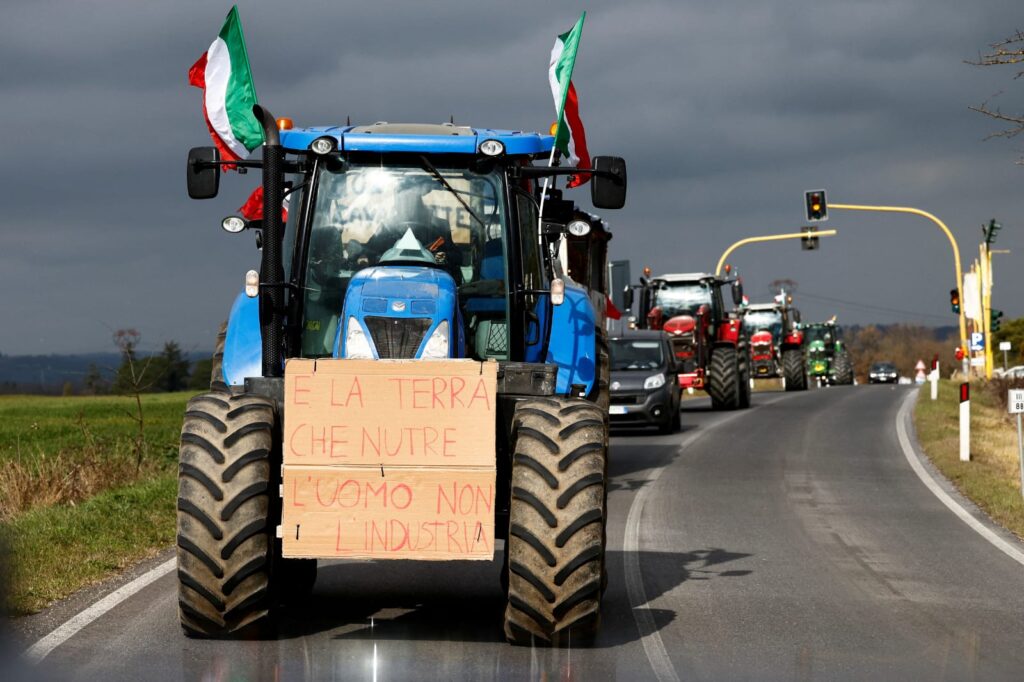
by CLIMATE CLASS CONFLICT – IT
In mid-January, major European cities were assailed by protesting truckers. Large and small agricultural entrepreneurs from France to Germany, from Belgium to Italy, from Romania to Poland and Spain, took to the streets against the European and national policies of the green transition. In Italy, protests took aim at the Budget Law approved in December, which has provided, among other things, the relief from income tax for farmers under 40, the IRPEF tax allowance for the agricultural sector and has decreed that all farmers are required to sign a private insurance against extreme weather events related damages. However, since “one cannot eat without agriculture” – a most trivial fact, yet one that continues to ensure enormous social power to the sector representatives – the protests were followed by a turnaround on the part of national governments, a revision of the CAP (Common Agricultural Policy), proposed by the Commission itself, and a substantial ideological legitimation of the agricultural entrepreneurs’ interests, which stand to gain considerable relevance ahead of the upcoming European elections. The protests have shown a number of contradictions of the European policies of the transition, the existence of a clash between factions of Capital within the sector as much as between these factions and the European governments. What has undoubtedly vanished behind the corporate dimension of the mobilization is the reality of exploitation of millions of male and female workers, most often migrants in some countries like Italy, employed in the European agro-industrial sector.
Almost everywhere protesters lashed out against Green Deal policies and the Farm to Fork strategy – the strategy to transform the European food system and make it more ‘sustainable and green’ – which have been a reason for the von der Leyen administration to pride themselves since it took office their inauguration. The agricultural sector has always been the subject of different tensions between member States and European institutions. Complicit in this is also a heterogeneous and differentiated productive base in which small and medium-sized entrepreneurs have found themselves crushed by the negotiating and decision-making power of large retailers and financial business. This heterogeneity was reflected also by farmers’ diverse national claims, despite the common European framework trying to regulate the sector. While in France and Germany the rising costs of diesel fuel for agricultural vehicles are targeted, in the eastern States, such as Poland and Romania, the decision to remove custom duties on Ukrainian wheat imports has hurt local business.The protests in Romania, have been particularly tense, not least because the country, which used to have the largest number of farms in Europe, has been undergoing a completely deregulated process of land concentration, encouraging the creation of huge estates. As a result of this reckless liberalization, the vast majority of workers exploited in the Italian and European agricultural sector are precisely Romanian migrants. Capital concentration, survival of small entrepreneurs through bonuses and exploitation of migrants around Europe: this has been the recipe of the CAP long before the green transition and it’s now questioned by those who see the room for negotiation in defense of their interests being shrunk. And it is in this context that the general increase in precise caused by the rapid succession of the Covid-19 pandemic and the war, together with the effects of the financialization of agricultural products, have had an impact on production and consumption that has contributed to the explosion of tensions.
The new CAP, which was initially intended to transform agriculture into a new strategic cornerstone of the European industrial project, came into force in 2023 for the 2023-2027 period and was approved with a two-year delay precisely because Member States had difficulties in integrating the new European priorities for the transition into their respective Strategic National Plans (NSPs). The newly introduced measures would strengthen the role of environmental and social cross-compliance, which farmers must meet in order to qualify for some of the direct funding provided and thus increasingly bind farmers to greener and more sustainable practices. On the other hand, the decision to allocate funds and loans on the basis of production volumes and cultivated hectares is still prevalent, which means that large agricultural holdings will continue to receive disproportionate fundings.
In Italy, at a meeting with trade associations, Meloni said she was on the side of farmers and against the “ideological transition” imposed by the European institutions, which are once again reframing the issue of food sovereignty through nationalist lenses. In the perspective of the European elections, the Italian government has also set up a coordination table on agricultural labour, to discuss with representatives of the various agricultural organizations and unions the main problems they are left to face: from labor costs to workforce recruitment, from management of migrant’s movement to workers’ professional training. While she lends an ear to the complaints of a category she can’t do without on the electoral field, the Italian government continues to follow European directives to advance an ecological transition which is now aimed solely at energy ‘security’ and innovation in Europe’s industrial fabric. The green transition has never pleased everyone: this was demonstrated in recent years, by the numerous strikes by miners and workers who were blackmailed because their work suddenly no longer ‘green’ enough for the bosses’ profits. Today, these protests signal the obvious crisis of a system that for years has been based on the high profits of multinational food corporations, the bonuses and subsidies given to the majority of small businessmen, and the poor labour of millions of people.
Therefore, while the ecological transition is experiencing national setbacks and transnational contradictions, it is being stubbornly pursued at the European level because there lays the possibility of protecting Capital accumulation and concentration at a time when they are both threatened by the transnational disorder produced by war. And so, in recent weeks, Meloni along with von der Leyen and other European leaders, flew to Cairo to discuss the strategic partnership between the EU and Egypt and to further define the Mattei Plan launched last January. The plan focuses on the promotion of agricultural and land reclamation projects and the transfer of technological innovation in these areas. It would also favor investments in job training and create projects “more economically and socially attractive to citizens” with the aim of supporting the Egyptian economy, which is likely to be further hit by the conflicts in Gaza and Sudan. And thus, the partnership between Italy and Egypt is once again being played out on the backs of migrants, with the EU allocating 7.4 billion euros, 200 millions of which will be used to strengthen borders and train a more palatable workforce for the European labor market. Once again, the green transition becomes the excuse to restrict the movement of migrant men and women in the Mediterranean, to externalise the borders of the European Union and to ensure new ground for the accumulation of European capital. As early as last January, when the Mattei Plan was launched, 80 organisations and representatives from different African countries sent a letter to some members of the Italian government denouncing the ‘neo-colonial’ nature of the plan and calling for a model of ecological transition that limits the dependence on fossil fuels, promotes strategies for adapting to climate change and puts African participation in negotiation processes at the center. They also demand to come out of the shadow of the green transition and not to find themselves on the wrong side of the divisions it produces; where ENI certainly isn’t, as it is at the forefront of the promoters for hydrocarbon projects in Africa and where it has already managed to generate an operating profit of 20,4 billion dollars in 2022 alone.
In the current framework, where the logic of war intertwines with the urgency to promote militarist and closed-border policies, agricultural and food resources, as well as energy resources, take on a strategic role. The European Union is thus attempting to govern fragments of war-accelerated transnational trends, through agricultural policies that increasingly promote the industrialization of the sector, with material effects that also depend on the ownership and production structure of each Member State. The farmers’ protests show very clearly the contradictions of a green transition that is increasingly reinforcing a new ground for accumulation. Contradictions that narrow the spaces for a class climate conflict that needs tools to oppose to the devastating climate effects and to the conditions of production and social reproduction of millions of people.


